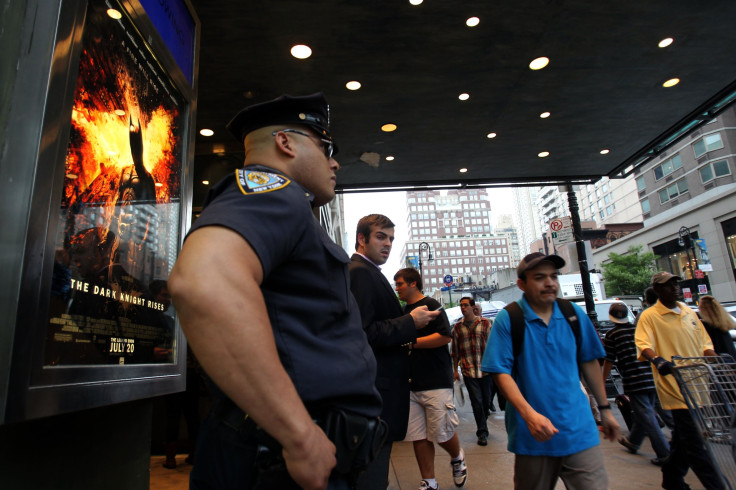Are Movie Theaters Safe? Exhibitors Plan Show Of Force For 'Star Wars' Security

Movie theaters are taking security seriously for "Star Wars: The Force Awakens" – even Darth Vader won't be allowed in. It's true: The major chains are asking fans to leave their masks, lightsabers or anything resembling a weapon at home.
Theater chains are beefing up security in advance of the opening of the latest installment of "Star Wars" on Thursday night. The most visible change will be a literal show of force: Visible armed guards will be posted at multiplexes across the country, a response to increased concern about so-called soft targets in the wake of terror attacks in Paris and San Bernardino, California.
Theaters have been on edge since 2012 when a mass shooting at a multiplex in Aurora, Colorado, killed 12 people and injured 70 others, and then two more shootings in Tennessee and Louisiana in 2015. But this week's release of "Star Wars: The Force Awakens" is expected to bring millions of fans to U.S. theaters; major chains are adding shows at 2 a.m., 3 a.m. and 5 a.m.
“Theaters have doubled security across the board over the past couple weeks,” said Tom DeLuca, owner of Global Security Services, which provides security personnel to more than 200 AMC, Regal and Cinemark cinemas. “Our big mantra is deterrence through high visibility, meaning when you walk into a theater and buy your ticket you see an armed man or woman with law enforcement or military training. People find that comforting.”
AMC, Regal and Cinemark theaters have banned “Star Wars” fans from wearing masks, face paint or bringing simulated weapons (including blasters) to any movie showings. Cinemark and Regal will prohibit lightsabers. AMC will allow lightsabers but has asked that fans turn them off during the movie.
DeLuca estimated that when “Star Wars” premieres, a busy theater in the heart of Manhattan will have eight trained security guards carrying sidearms at all times, while a smaller theater area in a rural area might only have a team of two personnel on duty.
In some communities, local police will be involved. "We will have an increased police presence monitoring theaters in the area," Diana Cooley, spokeswoman for the Aurora, Colorado, police department, said. James Holmes killed 12 people during a showing of "The Dark Knight Rises" in that city in 2012. Police in Aurora also increased security following theater shootings earlier this year.
Part of the rationale for that visibility approach is based on the notion that terrorists and would-be criminals survey a potential target before an attack.
“Typically you have one or two guards, either armed or unarmed, on duty. But now they might have three or four guarding the front and back entrances,” said Mark Lerner, CEO of Epic Security, which provides guards and security services in the New York City area. “No one is looking for a shootout. Our clients are looking to not have an incident, rather than an incident and security wins.”
But beyond the show of force, actual security procedures such as bag checks are expected to remain unchanged. Regal Cinemas announced in August that it would begin checking customers' bags after shootings in Louisiana and Tennessee. But it’s not clear how often Regal moviegoers are screened, if at all, and DeLuca said the number of theaters that carry out bag checks in 2015 is minimal. Regal, AMC, Cinemark, Carmike and Marcus theaters did not respond to a request for comment on this story.
“The movie theater is a place of comfort. When I was a kid I used to go there with my friends as a safe place to escape adults for two hours, and if you walk in and see metal detectors it becomes another one of those things we all hate,” DeLuca said, adding that AMC Theatres lost revenue when customers went through additional screening after 9/11. “Across the board, the response is that patrons feel good about security now.”
One in every 3 U.S. moviegoers said they believe metal detectors and armed guards should be in theater lobbies, according to a study from the research firm C4 conducted days after a shooter killed two people at a Louisiana showing of “Trainwreck.” But only 13 percent of those respondents said they’d be willing to pay an additional $3 that would come with another layer of security. Metal detectors are almost never used at the movies, in part because of an annual $200,000 to $1 million in estimated operating costs, depending on the size of the theater.
The U.S. saw 351 mass shootings, defined as "a case in which four or more people are killed or injured by gunfire in a single event, with a killed or injured perpetrator also counting in the tally," over a period of 334 days as of Nov. 30, according to previous reporting in International Business Times. Since 2013, there have been more than 1,000 mass shootings in the United States. Compare that to the 611,105 Americans who died of heart disease, or the 32,719 people who died in motor vehicle crashes in 2013 alone.
“I don’t think move theaters are any different from any other place where people congregate in terms of risk,” said Sherry Towers, an Arizona State University researcher who found that 20 to 30 percent of all mass shootings trigger a copycat crime, in part because of the national spotlight. “The media may be overblowing the risk of going to a movie theater compared to dying in any other number of ways that day.”
© Copyright IBTimes 2024. All rights reserved.




















